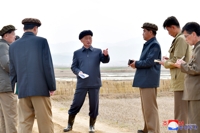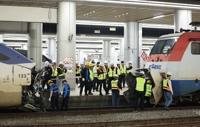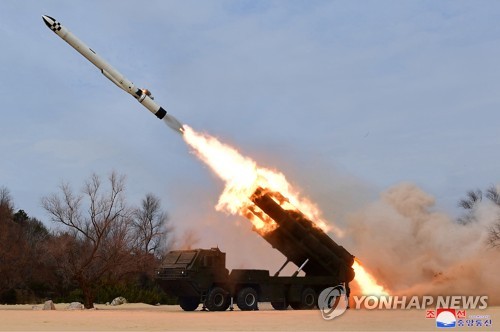(LEAD) U.S. apologizes for wrong anthrax shipment to S. Korea
(ATTN: ADDS more details in last three paras; ADDS photo)
By Oh Seok-min
SINGAPORE, May 30 (Yonhap) -- U.S. Defense Secretary Ashton Carter apologized Saturday for the wrongful shipment of a live anthrax sample to a U.S. military base in South Korea, vowing to take proper actions to prevent a recurrence, Seoul's defense ministry said.
The issue was part of wide-ranging topics between Carter and his South Korean counterpart, Han Min-koo, when they met in Singapore on the sidelines of an annual Asia security summit known as the Shangri-La Dialogue, ministry officials said.
According to the Pentagon, a U.S. military laboratory in Utah sent samples of live anthrax spores to the Osan Air Base in Pyeongtaek, just south of Seoul, as well as military and commercial laboratories in nine U.S. states by accident. The deadly biological agent was supposed to be killed before being distributed for research.
In the U.S. military base in South Korea, some 22 civilian and military personnel "may have been exposed (to the bacteria)," but "none of the personnel have shown any signs ... and there is no risk to the public," the U.S. Forces Korea (USFK) had said in an earlier announcement, adding the sample was destroyed and the sanitization process was completed.
"Carter extended his apology to South Korean Defense Minister Han Min-koo for the incident and vowed to take appropriate measures to prevent a recurrence," a South Korean defense ministry official told reporters.
Noting that an investigation into the case was under way, Carter pledged "to share the results in a swift manner with South Korea," the official said.
The South Korean official also quoted Carter as telling Han that those involved in the inadvertent delivery of the deadly agent would be held responsible.
The sample, supposed to be an inert bacteria, was for a training, which was meant to "defend the Korean people by testing currently fielded equipment and new systems that could better identify toxins and pathogens in the environment," according to the USFK.
The lethal disease by the bacterium Bacillus anthracis can be transmitted through contact or consumption of infected meat, though it is not contagious, according to experts.
Also on the table at the Han-Carter meeting were North Korea's ever-growing nuclear and missile threats and the upcoming visit to Washington in June by South Korean President Park Geun-hye for a meeting with U.S. President Barack Obama, Han's office said.
The possible deployment of a Terminal High Altitude Area Defense (THAAD) battery on the Korean Peninsula "was not on the list of agenda," another South Korean defense ministry official said, requesting anonymity.
Washington has expressed its willingness to deploy the advanced missile defense system in South Korea as part of its efforts to better cope with growing North Korean missile threats. The U.S. system is designed to shoot down short, medium and intermediate ballistic missiles at a higher altitude in their terminal phase using a hit-to-kill method.
graceoh@yna.co.kr
(END)
-
 Overdue debut of Korean abstract art pioneer Yoo Young-kuk at Venice Biennale
Overdue debut of Korean abstract art pioneer Yoo Young-kuk at Venice Biennale -
 Defense chief says N. Korea's hypersonic missile 'unsuccessful' in last-stage glide flight
Defense chief says N. Korea's hypersonic missile 'unsuccessful' in last-stage glide flight -
 Relax, immerse yourself in scents at Venice Biennale's Korean Pavilion
Relax, immerse yourself in scents at Venice Biennale's Korean Pavilion -
 N. Korea has capability to genetically engineer biological military products: U.S. report
N. Korea has capability to genetically engineer biological military products: U.S. report -
 S. Korea marks 30th anniv. of Korean Pavilion at Venice Biennale with contemporary art
S. Korea marks 30th anniv. of Korean Pavilion at Venice Biennale with contemporary art
-
 Overdue debut of Korean abstract art pioneer Yoo Young-kuk at Venice Biennale
Overdue debut of Korean abstract art pioneer Yoo Young-kuk at Venice Biennale -
 Relax, immerse yourself in scents at Venice Biennale's Korean Pavilion
Relax, immerse yourself in scents at Venice Biennale's Korean Pavilion -
 Artist Lee Bae captures ethereal Korean aesthetics at Venice Biennale
Artist Lee Bae captures ethereal Korean aesthetics at Venice Biennale -
 S. Korea marks 30th anniv. of Korean Pavilion at Venice Biennale with contemporary art
S. Korea marks 30th anniv. of Korean Pavilion at Venice Biennale with contemporary art -
 Defense chief says N. Korea's hypersonic missile 'unsuccessful' in last-stage glide flight
Defense chief says N. Korea's hypersonic missile 'unsuccessful' in last-stage glide flight
-
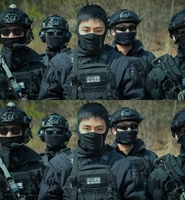 Facebook page unveils photos of BTS member V in counter-terrorism unit gear
Facebook page unveils photos of BTS member V in counter-terrorism unit gear -
 Gov't likely to accept university chiefs' request to lower med school enrollment quota
Gov't likely to accept university chiefs' request to lower med school enrollment quota -
 S. Korea not invited to G7 summit meeting this year: sources
S. Korea not invited to G7 summit meeting this year: sources -
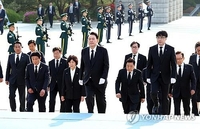 Yoon's approval rating sinks to lowest point since taking office
Yoon's approval rating sinks to lowest point since taking office -
(URGENT) N. Korea conducted 'super-large warhead' test for strategic cruise missile: KCNA














